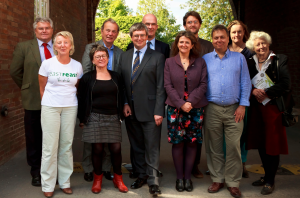 The third Aldeburgh Food & Drink Festival Conference took place on Friday 27 September and was attended by 170 delegates. It was a stunning success, with inspiring talks and lively discussions which continued well after the conference had finished.
The third Aldeburgh Food & Drink Festival Conference took place on Friday 27 September and was attended by 170 delegates. It was a stunning success, with inspiring talks and lively discussions which continued well after the conference had finished.
As with previous conferences, the subject was a challenging one – ensuring food (and water) security at a time of population growth, diminishing natural resources, climate change and increasing demand from developing countries as they switch to more western style meat and dairy based diets.
The purpose of the conference was to increase understanding between scientists, farmers (large and small) and representatives of community agriculture, showing that they all have a part to play. The conference aroused much interest with an audience that included farmers, scientists, teachers, local authorities, retailers, food producers, concerned individuals and students with one group coming from as far away as Cornwall.
The conference was chaired by Sheila Dillon, the renowned presenter of BBC Radio 4 Food Programme and featured a keynote speech by Professor Sir Gordon Conway, world expert on food security and the role of science who explained
“the issue of food security is literally a matter of life and death – globally 1 in 3 children under 5 are malnourished. The challenges are volatile, ambiguous and complex, affecting the environment as well as our health and wellbeing. However, science and working with farmers and the community will provide many of the solutions.”
The outstanding line up-of speakers drawn from science, farming and the community proved that the issue of Food Security requires a diversity of solutions and everyone has a role. There is a basic need for science and technology but this has to go hand in hand with policy change, cultural change, skills development and improved communication and understanding between all concerned.
The need for farmers and scientists to work together to improve knowledge exchange and the transfer of skills were recurrent themes throughout the day. Scientists also need to find new ways of communicating with the public, as do farmers. They are brilliant innovators but this needs to be more widely known as does the knowledge of amateur gardeners, horticulturalists and naturalists.
Local communities also need to be involved. Joanne Mudhar from Oak Tree Low Carbon Farm near Ipswich demonstrated how local people successfully work the land and growing their own food reconnecting them with food production.
We also heard from Dr Gordon Jamieson of the John Innes Centre in Norwich about the ground-breaking research on cereals and other food crops, showing how a plant’s own genes can provide the solution to pests and diseases, utilising nitrogen from the air, coping with climate change and even improving our health. Conference delegates were each given a piece of Beneforte Superbroccoli, a fascinating variety developed at the JIC and the Institute of Food Research in Norwich, not only does it help maintain cardiovascular health but it can reduce the risk of some forms of cancer and is now being trialled as a treatment for arthritis.
Perhaps one of the most inspiring moments of an inspiring day was when children from three Lowestoft schools marched into the auditorium Drumming for Change using garden tools. They declared that they knew how to grow, cook and enjoy their own food and asked the audience to make sure that every Suffolk school has a kitchen and a garden so that they could do the same.
The challenge of ensuring food and water security, both now and the future, are enormous but the conference showed that if all work together solutions can be found.